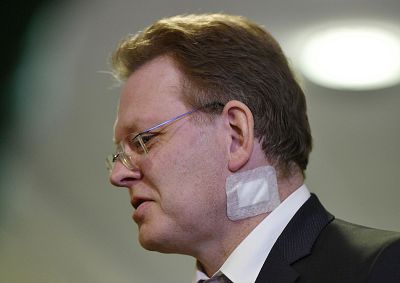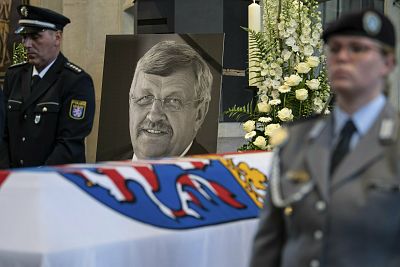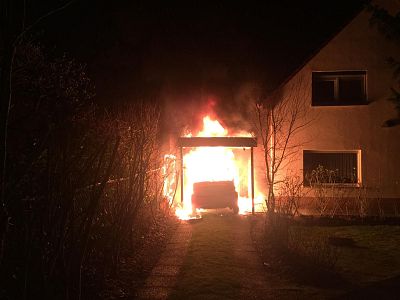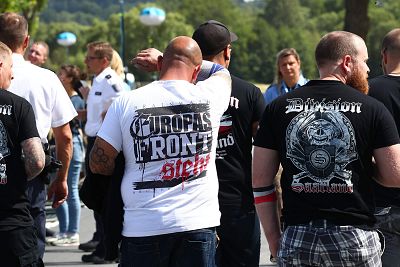"We had the opportunity to build a new democracy, and now we see that we need to fight for it again," said a mayor, who was stabbed 18 months ago.
Andreas Hollstein, the mayor of Altena, in the west of Germany, says he receives at least two death threats a month by mail or by phone. Though they are scary, they don't compare to the night 18 months ago when a man approached him at a kebab shop.
 ADVERTISEMENT
ADVERTISEMENT
 ADVERTISEMENT
ADVERTISEMENT
The man asked if he was the mayor and said, "You let me die of thirst and let 200 refugees into Altena," Hollstein recalled at the time. Then the man plunged a knife into Hollstein's neck.
Hollstein, who ended up with a 6-inch gash, had became nationally known during the refugee crisisfor welcoming migrants to his city. Authorities believed there was a political motive behind the attack and arrested a suspect.
Since then, Hollstein has been outspoken about the need to tackle right-wing extremism in Germany. Yet last month another politician who spoke out in defense of migrants, Walter Lübcke, was fatally shot in the head on the terrace of his home. A man with far-right views was arrested and confessed, though he later recanted.
Lübcke's death reignited a debate about whether Germany, long praised for confronting the ghosts of its extremist past, is in fact doing enough to combat far-right groups in the 21st century. Like Hollstein and Lübcke, politicians and public figures in Germany who speak out about far-right extremism, migration and anti-Semitism are often on the receiving end of both threats and violence.
News
According to data released in a report last month by Germany's domestic intelligence agency, there are 12,700 "violence-orientated right-wing extremists" in the country — which is more than half of the number of all right-wing extremists.
"Given the high affinity for carrying weapons in the far-right extremist spectrum, those numbers are extremely worrying," Interior Minister Horst Seehofer said in presenting the report. "The risk of an attack is high."
The issue is especially resonant in Germany, given its Nazi past. In the decades after World War II, West Germany in particular pushed an education program that attempted to confront the country's history, the Holocaust and the need for democracy. Seven decades later, far-right extremism is a topic that many thought had been vanquished, but some experts say that misperception may have led to a more lax approach than is now necessary.
"I think it is because of our Nazi past that people don't want to recognize the threat of the far-right today," said Anetta Kahane, who heads the anti-racism group, the Amadeu Antonio Foundation. "Like an evil child, it reminds society of other evil members of the family."
Though the numbers in the recent report haven't changed much since last year, the right wing's slant toward aggression has increased, according to Kahane, who said that she receives attacks daily on social media.
"It is becoming more aggressive because they don't feel enough resistance by the population or by the government," Kahane said.
Her foundation has also received bomb threats, a fake anthrax letter and a fake explosive device, and right-wing extremists entered or tried to enter the foundation with video cameras three times, according to the foundation.
"There is a direct relationship between the high amount of hatred online and people who are willing to attack others in real life," she added.
It was precisely because of an increase in right-wing sentiment in Berlin that Ferat Kocak became active in Die Linke, a left-wing party, in 2016. But because of that activism, he believes he became a target of right-wing extremists: His car was torched in the middle of the night in January 2018 as it sat parked next to his parents' home, where he lived at the time.
Police said they have two suspects in the attack, but investigations are ongoing and nobody had been charged.
Kocak now regularly receives emails and messages on social media from people telling him "you should have been shot," and "you should have been burned, too."
"I am afraid. I can't sleep at night. When I hear noises in the middle of the night, I get up. I check behind me when I walk on the street. But I won't stay still, I talk about it," said Kocak, 40, who now serves as vice speaker of Die Linke in Neukölln, a borough of Berlin.
Though the official figures show that extremist sympathizers comprise a tiny part of the population, Andreas Zick, who studies extremism at the University of Bielefeld, estimates their reach is much deeper thanks to social media sites where others can watch and read about the topic.
"There has been a normalization of right-wing attitudes in society," said Zick, who studies such attitudes in Germany. "The extreme right wing has been more successful in creating a movement which has strong links into the middle of society."
Zick and other experts said that normalization has been helped by the presence of the right-wing political party Alternative for Deutschland, or AfD, which has a strong anti-immigrant stance and holds 91 out of 709 seats in the German Parliament. The party has found a strong following, especially in the east.
Last month, Chancellor Angela Merkel's party ruled out any form of cooperation with the AfD, saying its rhetoric had contributed to an atmosphere of hate that encouraged political violence.
In Berlin alone, requests on how to handle threats by right-wing extremists by both individuals and organizations have roughly tripled since 2012-13, according to the organization Mobile Counselling Against Right-Wing Extremism.
"We see that the AfD in Parliament is very confident. That also gives right-wing extremists the confidence to threaten people who stand for democracy and human rights," said Bianca Klose, who leads the organization. "That is a new development."
For Hollstein and other politicians, the antidote to extremism is awareness. They are now pushing for greater openness and education around the issue.
"It's not enough to make laws, but we need to educate children and parents," said Mirjam Blumenthal, the leader of the Social Democratic Party in the Neukölln Parliament.
Two years ago, her car was also torched by right-wing extremists. She is unable to speak about more recent incidents because of ongoing police investigations.
"Our democracy is strong. But our democracy is in danger," Blumenthal said.














